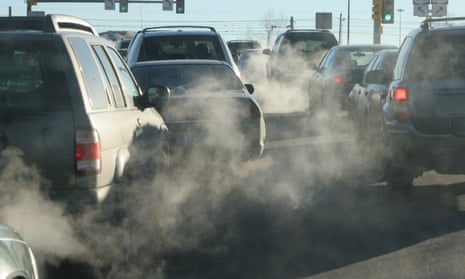Vehicle fuel taxes should rise to combat the air pollution crisis in the UK, with an extra charge on diesel, according to the conservative thinktank Bright Blue.
A report calls for VAT to be abolished on electric cars and for citizens to be able to report idling vehicles and receive a share of fines levied. It also proposes that the speed limit in all urban areas is cut from 30mph to 20mph and that local authorities should be able to profit from pollution charging schemes to fund clean-air projects.
Most urban areas in the UK register illegal levels of nitrogen dioxide (NO2) pollution, which mainly comes from vehicles. But while Britain’s particulate levels are legal, they are above World Health Organization guidelines, which Bright Blue said should be the targets adopted by the UK. Polling for the thinktank showed 70% of people in the UK were concerned about the health impact of air pollution and wanted government action.
Dirty air causes 40,000 early deaths every year in the UK, and in 2016 a committee of MPs called the problem a “public health emergency”. The damage to lungs and hearts is well established but the latest research shows air pollution may be damaging every organ and virtually every cell in the body.
Government plans to cut NO2 pollution have been declared illegally poor by the high court on three occasions and the former environment secretary Michael Gove recently said the UK had “failed to properly live up to our obligations to improve air quality”.
Ryan Shorthouse, the chief executive of Bright Blue, said: “The evidence of the scale and impact of air pollution is growing and alarming. As the UK leaves the EU, there is a need and an opportunity to improve legislation, policies and accountability around air quality. Despite the rhetoric from the government, enough is not being done to tackle NO2.”
The Bright Blue report said the freeze on fuel duty rises, in place since 2010, should end. The freeze has saved motorists about £6bn but is estimated to have increased traffic by 4%, and therefore pollution as well. Diesel, which produces most NO2, should have an additional tax on top, according to the report.
Diesel cars are currently charged more vehicle excise duty than petrol cars only in their first year, but the difference should be permanent, Bright Blue said. It added that VAT should not be charged on electric cars to help restore their attractiveness after recent cuts in subsidies.
Perhaps the most striking recommendation is that citizens should be able to report idling vehicles and share the fine with authorities. In New York City, citizens get 25% of fines levied on buses or trucks caught idling for more than a minute outside schools or three minutes elsewhere. The fines range from $100 to $2,000 (£83 to £1,650) and Bright Blue said the policy in the UK should be expanded to include cars.
Some local authorities have reduced the speed limit in urban areas to 20mph to reduce injuries and deaths from road accidents. But Bright Blue said the limit should be implemented in all urban areas, with research indicating it could cut NO2 pollution by 25-32%.
Charging polluting vehicles to enter urban centres, as in London, is a highly effective way of cutting pollution. Bright Blue said local authorities should be allowed to make “reasonable profits” from such clean air zones to fund charging points for electric vehicles, local scrappage schemes for old cars and public transport.
Simon Alcock from ClientEarth, the environmental law firm that defeated UK ministers in court, said: “This report is hugely welcome and shows the public want greater ambition from the government on air pollution. The government needs to make WHO guidelines legally binding by 2030, help people – especially those on low incomes – move to cleaner forms of transport and start treating air pollution in this country as the public health crisis and consumer scandal that it is.”
A government spokesman said: “We know the impact air pollution has on communities around the UK, which is why we are stepping up the pace and taking urgent action to improve air quality. Our £3.5bn Clean Air Strategy – praised by the World Health Organization as ‘an example for the rest of the world to follow’ – is the most ambitious air quality strategy in a generation.”
Shorthouse said: “We are a pro-market thinktank, but sometimes there are inefficiencies and inequities that arise in markets and therefore good government regulation and spending is needed. It is a conservative thing to tax things that have negative effects on people and reduce the tax burden on things that are desirable.”
